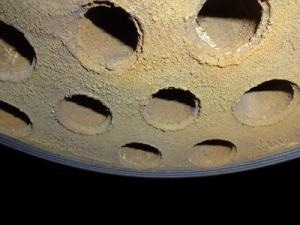One customer submitted Kipp Umwelttechnik GmbH a graphite heat exchanger for cleaning. The 31 inner tube surfaces of the 3000 mm long tube bundle heat exchanger were afflicted with extremely hard, multi-layered residues. For the removal of the residues was only a mechanical cleaning possible. Through the use of chemicals, such deposits cannot be eliminated.

Graphite exchangers are primarily used in the area of corrosive media such as e.g. Hydrochloric acid, sulfuric acid, lactic acids or hydrofluoric acid, but also for gases such as HCl gas, used and are there often no alternative despite higher investment costs. Graphite offers high corrosion and heat resistance with good heat transfer. When heated graphite expands only slightly.
The advantage of tube bundle heat exchangers is above all the large heat transfer surface that is created by the individual tubes. In addition, tube bundle heat exchangers cannot be used exclusively as heaters, coolers or condensers, but also as evaporators and absorbers.
High-pressure cleaning was out of the question due to the relatively low compressive strength of the material compared to the deposits to be removed. The hardness of the residues would have had to be cleaned here with very high pressure, which would have led to the destruction of the pipes.
Kipp Umwelttechnik GmbH used a special application of the patented TubeMaster process. The special problem was that the hardness of the residues to be removed was much higher than the hardness of the graphite material of the pipe inner surfaces. However, the surfaces were not allowed to be damaged. The many years of experience of Kipp Umwelttechnik GmbH in the field of cleaning shell and tube heat exchangers made it possible to solve this problem. The inner pipe surfaces were completely cleaned over the entire length and the heat exchanger was made available to the customer again.